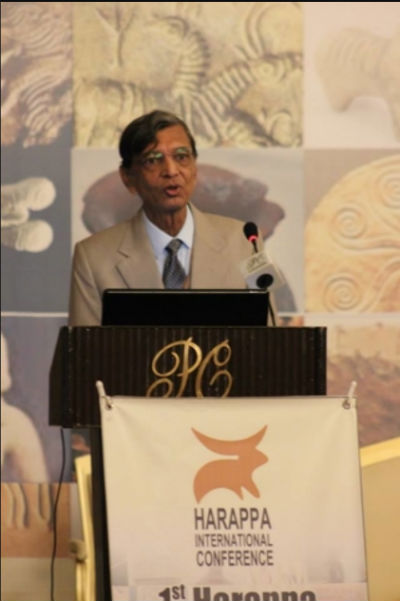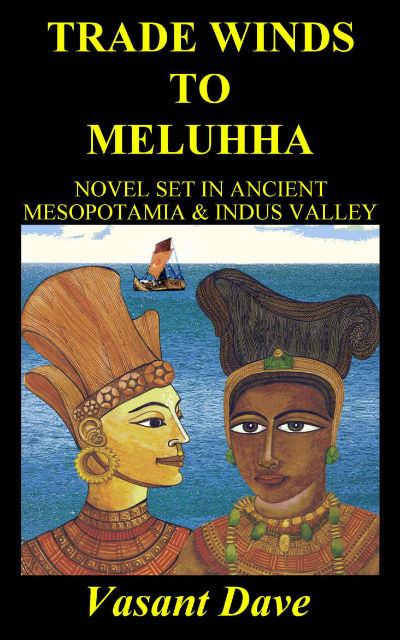Hi Friends,
Allow me to Introduce Shri Vasant Dave (aka Vasantrai Dave), the author of Trade Winds to Meluhha.
To know more about the book you can read our detailed review for the same at:
Mr. Vasant Dave has a passion for exploring Indus Valley civilization (and civilizations before that too) in both known and unknown arena. He is also associated with a very popular website in the same arena – https://www.harappa.com as a community moderator. He is considered an expert in various areas and his book is a proof of his knowledge.

Mr. Vasant Dave | Author Of Trade Winds Of Meluhha – Addressing A Conference
You can follow the below given links to know more about these ancient civilizations and Mr. Dave
- https://www.harappa.com/category/author-article/vasant-dave
- https://www.facebook.com/BronzeAgeNovel/
Reading the book made us curious to know more about Mr. Dave and thus we approached him. Fortunately, the things worked out positively and from our team, I got a chance to have a small Q/A session with him. I would love to share it with you all.
We are glad to have a conversation with you. Thank you for sparing some time to have a Q/A session with us. Your book “Trade Winds to Meluhha” is getting positive responses in both commercial and critical aspects. Please accept our congratulations for the same and tell us something about it (the response to the book).
Thank you, Team ThinkerViews. I am honoured to be offered this opportunity on your professional and trustworthy Blog.
Yes, “Trade winds to Meluhha” has started getting encouraging responses since I rewrote it in 2016. It might be interesting to your readers to know that the sale of my novel which is set in the Indus Valley Civilization is higher in the USA and Canada than in India and Pakistan whose people are associated with the ancient culture. I am yet to understand this mysterious phenomenon!
I am an electrical engineer whose entire career was spent marketing industrial goods. After retirement, I paid heed to the advice that the residents of an old-age home give to a cribbing newcomer in the film “Lagé Raho Munnabhai” — about a “Second Innings” in life. I had always wanted to see my name on a book cover. I examined several genres, and decided that with my background, I would be able to do justice to historical fiction.
Ever since we were trainees, it was ingrained in our psyche that we should respect clients’ feedback. Habits die hard, but good ones die harder. Readers’ genuine suggestions have indeed added immense value to the way I finally narrated my story.
In my constant effort to develop new markets for our engineering products, I used to write articles in professional publications, and present technical papers at conferences. Through experience, I learnt that one could hold the listeners’ attention if one related appropriate incidents, or relevant stories to the facts that one presented.
That practice of several decades encouraged me to take up the task of writing credible fiction that is set in a pre-historic background.
Till I was forty or so, I wasn’t aware that the ancient Indus Valley Civilization was spread much wider than Harappa and Mohenjo Daro. It was disconcerting when I found that the state of Gujarat where I lived, possessed two of its earliest settlements — Lothal near Ahmedabad with a port, and Dholavira in Kutch with a water conservation scheme.
I wished that our next generation wasn’t as oblivious of our illustrious past as I had been. To attract them, it was necessary to attach a narrative to the bare facts.
The Harappans carried out overseas trade through ports like Lothal. The trading partners, viz. Mesopotamia (Iraq), Dilmun (Bahrain) and Magan (Oman) had had their own great civilization that gave equal rights to women. We are talking of a period of 4,000 years in the past. Looking to women’s emancipation issues throughout the east of Suez, it sounded unbelievable.
That’s what made me think of weaving a story around trade and cultural relations between the two ancient civilizations.
It was the word used by the Mesopotamians to identify the Harappan Civilization. In order to collect ideas for my novel, I studied the writing of experts like Mahadevan, Ratnagar, Parpola, Meadow and McIntosh. All used it with an extra ‘h’, and I simply took their ‘word’ for it J
A “method writer”.
I let the story incubate inside my mind. A convincing historical plot demands a framework of facts backed by evidence. I enjoy doing research into archaeological discoveries, based on which, I like imagining the life of the people during that period.
At some point of time, random facts and imagined circumstances start falling into place, and gradually an outline for a story emerges like a butterfly from a pupa.
I would stick to my strength in writing historical fiction.
I have been thinking about writing a novel involving the Indus Valley and ancient Egypt, a contemporary of the Harappan and the Mesopotamian cultures. I have not yet found a historical ‘peg’ that could carry as convincing a plot as that of ‘Trade winds to Meluhha’.
Yes. To portray the the period, I sat with “Neelkant Choudhary”, artist of old “Madhubani” style of painting. We studied the statuettes depicting women’s hairstyles and ornaments discovered on Harappan archaeological sites. Then Neelkant visualized images of the Meluhhan Velli and the Sumérian Ann whom you see on the cover.

Trade Winds to Meluhha by Vasant Dave | Cover Page
In the background is Thor Heyerdah’s Tigris, a reed boat with a square sail. To remove any doubt over small vessels sailing between Harappan and Mesopotamian ports, the Norwegian explorer had started from Iraq in the Tigris, crossed the Persian Gulf and the Arabian Sea, and successfully reached Pakistan in 1977.
The symbols are directly taken from a signboard discovered at the Dholavira site. I used them to create the treasure hunt story.
The e-book format of “Trade winds to Meluhha” also contains lots of additional illustrations such as the artist’s impression of Lothal port (where the Sumerian protagonist Samasin lands), the so-called “Pashupati” and “Jallikattu” seals (the Horned Hermit’s character, and Samasin’s buffalo fight respectively), the bead necklace (source of suspense in the novel), and the statuettes of the “Priest King” (the character of Merchant Siwa Saqra) and the “Dancing Girl’ (the female protagonist, Velli).
The Big Six publishers regretted, so I learnt how to format an e-book and self-published it in 2012. When “Print-on-Demand” became possible in 2017, I published the printed version cost-effectively and used Amazon and Flipkart to sell it.
Dr. Yaqoob Yawar, an accomplished Urdu novelist, has translated my novel under the title “Meluhhai Baad-e-Tijarat” and the manuscript is ready.
The entire exercise of writing ‘Trade winds to Meluhha’ and revising it has sharpened my skills as a story teller. As I wrote the chapters, cut, split and re-formed them, I realized what a wonderful gift God has given to humans. Some outstanding ‘association’ and ‘turn of event’ ideas sprang up in my mind like a jack-in-the-box. I could incorporate many in the narrative, enhancing its ‘interest’ and ‘suspense’ contents.
Jule Verne and RL Stevenson in English; Gunvantrai Acharya in Gujarati.
“Vinela Fool”, a series of short stories written in various Indian languages, and translated in Gujarati by ‘Harishchandra’. It is a pen name adopted by two women named Harvilas and Chandrakanta, who were disciples of social reformist Vinoba Bhavé.
Most Indian parents habitually instill a love for traveling in their children. My father had gifted me his Kodak box-camera, which increased my interest in traveling and ignited it in outdoor photography.
Video trailers are a very effective means for promoting a book. I plan to tap that resource.
An EBook reader is a portable library, and its handiness is a boon to the frequent traveller. The Ebook reader helps inquisitive young minds to get affordable access to technical and professional books whose print versions cost very high.
Like most grandfathers, I prefer to read traditional printed books. Nevertheless, I am grateful to the EBook technology as a new author, and wish that more and more people read EBooks.
Social networks have imparted high speed and wide reach to communication; but users need to be judicious in trusting their contents.
Yes, I did. I cannot put a finger on how it affected my persona; but several times, the recollection of a parable has helped me to take decision when put in a dilemma.
Sadly, yes.
There is a ray of hope though. Picture books like those published by Amar Chitrakatha do help parents to make up for this imminent vacuum. Makers of children’s cartoon films could contribute a lion’s share in this effort if they decided to produce TV episodes carrying a moral message.
Yes, it does. Indian “moral and ethical stories from grandparents” lay a solid foundation for growing up as a responsible citizen. For instance, consider Gandhari in epic Mahabharata. She was king Duryodhana and warrior Dushasana’s mother, and took them to task before the entire court when they misbehaved with Draupadi.
If the ladies related to ‘kul-deepaks’ infesting street-corners had learnt this lesson from our epics, crimes against women wouldn’t have reached such alarming proportions in India.
- Facebook: http://www.facebook.com/BronzeAgeNovel
- Author website: http://vasantdave.weebly.com/index.html
Your readers might enjoy a historical short story involving Siwa Saqra, one of my characters in Trade winds to Meluhha.
Quick Purchase Links:
- Buy Book From Amazon India – Paperback
- Buy Book From Amazon India – Kindle EBook
- Buy Book From Amazon US – Kindle Ebook
- Buy Book From Amazon US – Kindle Ebook
Over To You:
Let us know that what do you think about this Interview session? Do you want us to ask anything else to her on your behalf? Do let us know. Also, let us know which other authors you like us to interview? Do let us know your thoughts and remarks via comments below. Do not forget to share this article with your friends over various social networks via Twitter, Facebook and others. And yes, you may like to subscribe to our RSS feeds and follow us on various Social networks to get latest updates for the site to land right in your mail box.
 ThinkerViews – Views And Reviews Personal views and reviews for books, magazines, tv serials, movies, websites, technical stuff and more.
ThinkerViews – Views And Reviews Personal views and reviews for books, magazines, tv serials, movies, websites, technical stuff and more.



